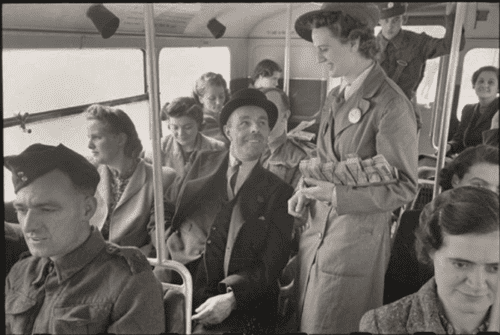
Alan Payling, having had a look through the industry’s film archives, takes a light hearted look at a ten films where buses and coaches have a starring role
My newspaper recently carried a feature about 10 films that were made largely on the railways. You will recall some of them. But the article got me thinking about films that have featured PSVs. There were a few that immediately sprung to mind when I started drawing up a list, but it didn’t take long to get to 10. I didn’t want to suggest films where buses and coaches were just a backdrop, even though the vehicles would now be of historic interest. I was looking for films that would show how the PSV industry worked at various times in its history. In that sense then, the suggestions here aren’t so much films as documentaries. You will notice that none of them were Oscar winners and some of them are decidedly quirky. They are entered in the order in which they sprang to mind so the top 10 I have come up with just means that they featured prominently in my memory. So here goes, this is what I came up with.
British Transport Films
Back in the day, when you went to the pictures, you got a lot more than one film, a few trailers and some ads. In addition to the main feature, there would be a ‘B’ movie which was a complete but second rate usually forgettable film. There would of course be trailers for upcoming films and a newsreel. But there would also be a short film of some sort shown between the two films and the newsreel. You got your money’s worth in those days! One of the major film companies that made such short films was British Transport Films.
As the name suggests, these films were short documentary films, mainly about the railways being the major mode of transport for goods and people in the 1930s, ‘40s and ‘50s. One of the most famous, dramatic, and poetic of the type was Night Mail of 1936. This was made by the Post Office’s own film unit and included a voice over by John Grierson, the father of documentary film, a poem by W.H. Auden and music by Benjamin Britten: all big hitting cultural figures in their day. British Transport Films also made a number of films about many aspects of the bus and road haulage industries with a greater emphasis on the buses. The interesting thing about these films is that they look into the nitty-gritty of the industry and ended up in what might be regarded nowadays as some quite surprising places, like LT’s canteens or the people who made the blinds for the buses. The newsreels provided by British Pathé News also covered various aspects of the bus industry. Then, as now in the media, there is of course a greater focus on London, but their cameras did end up travelling far and wide throughout this sceptred isle. If you haven’t seen them, there are lots on YouTube where I found the ones mentioned below. Have a look. You should be able to find them by using the title and date of each paragraph below.
1. Our Canteens, 1951
British Transport Films
So where does a film about canteens fit into this list? I bet you were expecting film stars galore, weren’t you? Well, back in the day, the people who kept the wheels of organisations like the old London Transport turning were regarded as stars in their own right by some documentary makers for the work they did. For me, the women in the canteen at my old London bus garage, Stamford Hill, really were stars. And that is what this film celebrates, the role of those unsung heroes who helped keep London’s buses moving on full stomachs. This is one of a series of British Transport Films made for the London Transport Executive by Trident Films that celebrate the work that ordinary people did, including people that all too often are taken for granted. And, they got it right with this film. Though it was made a good few years before my early turns, the lively nature of my old canteen is captured and brings back many memories of the impatient and rumbustious nature of the canteen queue waiting impatiently to be served when you only had a 40-minute meal break. There is one big difference though: while part of the commentary is provided by a white cockney sparrow, in my day, the canteen women were more often than not from the Caribbean or Africa. So it wasn’t so much: ‘Two teas Doris*,’ but more like; ‘Get us two big boy’s breakfast, Carmen. we haven’t got long darlin.’
*Takes you back to the days of crew operation! You would never order just one tea.
[…]By subscribing you will benefit from:
- Operator & Supplier Profiles
- Face-to-Face Interviews
- Lastest News
- Test Drives and Reviews
- Legal Updates
- Route Focus
- Industry Insider Opinions
- Passenger Perspective
- Vehicle Launches
- and much more!


